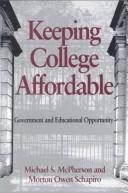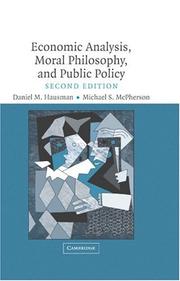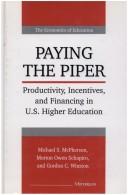| Listing 1 - 10 of 13 | << page >> |
Sort by
|
Year: 1982 Publisher: Chicago, Ill.,
Abstract | Keywords | Export | Availability | Bookmark
 Loading...
Loading...Choose an application
- Reference Manager
- EndNote
- RefWorks (Direct export to RefWorks)
Book
ISBN: 0691229937 Year: 2023 Publisher: Princeton, New Jersey : Princeton University Press,
Abstract | Keywords | Export | Availability | Bookmark
 Loading...
Loading...Choose an application
- Reference Manager
- EndNote
- RefWorks (Direct export to RefWorks)
"An invaluable primer on the role economic reasoning plays in campus debate and decision making. Campus Economics provides college and university administrators, trustees, and faculty with an essential understanding of how college finances actually work. Sandy Baum and Michael McPherson explain the concepts needed to analyze the pros, the cons, and the trade-offs of difficult decisions, and offer a common language for discussing the many challenges confronting institutions of higher learning today, from COVID-19 to funding cuts and declining enrollments. Emphasizing the unique characteristics of the academic enterprise and the primacy of the institutional mission, Baum and McPherson use economic concepts such as opportunity cost and decisions at the margin to facilitate conversations about how best to ensure an institution's ongoing success. The problems facing higher education are more urgent than ever before, but the underlying issues are the same in good times and bad. Baum and McPherson give nontechnical, user-friendly guidance for navigating all kinds of economic conditions and draw on real-world examples of campus issues to illustrate both institutional constraints and untapped opportunities. Campus Economics helps faculty, administrators, trustees, and government policymakers engage in constructive dialogue that can lead to decisions that align finite resources with the pursuit of the institutional mission"-- "An invaluable primer on the role economic reasoning plays in campus debate and decision making"--
Universities and colleges --- EDUCATION / Higher. --- Colleges --- Degree-granting institutions --- Higher education institutions --- Higher education providers --- Institutions of higher education --- Postsecondary institutions --- Public institutions --- Schools --- Education, Higher --- Administration --- Decision making. --- Finance. --- Ability To Pay. --- And Interest. --- Associate degree. --- Athletic Performance. --- Austerity. --- Bachelor's degree. --- Boutique. --- Budget constraint. --- Budget. --- Budgets. --- Campus. --- Cartesian coordinate system. --- Class size. --- Complementary good. --- Cost of attendance. --- Cost–benefit analysis. --- Currency. --- Curriculum development. --- Customer. --- Designer. --- Dynastic wealth. --- Economic equilibrium. --- Economics. --- Employment. --- Expense. --- Faculty (academic staff). --- Family structure in the United States. --- Financial endowment. --- Fiscal Effort. --- For Men. --- For-profit higher education in the United States. --- Full-time equivalent. --- Funding. --- Governance. --- Graduate school. --- Grandparent. --- Gratification. --- Higher education. --- Household. --- Illustration. --- Income. --- Inefficiency. --- Inflation. --- Institution. --- Insurance. --- Interest. --- Investment. --- J. C. Penney. --- Labour economics. --- Liberal arts college. --- Liberal arts education. --- List price. --- Market (economics). --- Master's degree. --- Middle class. --- Multinational corporation. --- NCAA Division III. --- Nest Egg. --- News. --- No Free Lunch (organization). --- Nonprofit organization. --- Of Education. --- Operating budget. --- Operating expense. --- Opportunity cost. --- Paycheck. --- Percentage point. --- Percentage. --- Philosophy. --- Policy analysis. --- Policy. --- Private school. --- Private sector. --- Private university. --- Productivity And Costs. --- Public institution (United States). --- Public university. --- Rates (tax). --- Research center. --- Retirement Contribution. --- Retirement. --- Revenue. --- Salary. --- Savings account. --- Social science. --- State government. --- Student loan. --- Supply (economics). --- Tax. --- Teacher. --- Testimonial. --- The Chronicle of Higher Education. --- Trade-off. --- Tuition freeze. --- Tuition payments. --- United States Department of Education. --- Values education. --- Vanderbilt University. --- Year. --- United States. --- ABŞ --- ABSh --- Ameerika Ühendriigid --- America (Republic) --- Amerika Birlăshmish Shtatlary --- Amerika Birlăşmi Ştatları --- Amerika Birlăşmiş Ştatları --- Amerika ka Kelenyalen Jamanaw --- Amerika Qūrama Shtattary --- Amerika Qŭshma Shtatlari --- Amerika Qushma Shtattary --- Amerika (Republic) --- Amerikai Egyesült Államok --- Amerikanʹ Veĭtʹsėndi͡avks Shtattnė --- Amerikări Pĕrleshu̇llĕ Shtatsem --- Amerikas Forenede Stater --- Amerikayi Miatsʻyal Nahangner --- Ameriketako Estatu Batuak --- Amirika Carékat --- AQSh --- Ar. ha-B. --- Arhab --- Artsot ha-Berit --- Artzois Ha'bris --- Bí-kok --- Ē.P.A. --- É.-U. --- EE.UU. --- Egyesült Államok --- ĒPA --- Estados Unidos --- Estados Unidos da América do Norte --- Estados Unidos de América --- Estaos Xuníos --- Estaos Xuníos d'América --- Estatos Unitos --- Estatos Unitos d'America --- Estats Units d'Amèrica --- Ètats-Unis d'Amèrica --- États-Unis d'Amérique --- ÉU --- Fareyniḳṭe Shṭaṭn --- Feriene Steaten --- Feriene Steaten fan Amearika --- Forente stater --- FS --- Hēnomenai Politeiai Amerikēs --- Hēnōmenes Politeies tēs Amerikēs --- Hiwsisayin Amerikayi Miatsʻeal Tērutʻiwnkʻ --- Istadus Unidus --- Jungtinės Amerikos valstybės --- Mei guo --- Mei-kuo --- Meiguo --- Mî-koet --- Miatsʻyal Nahangner --- Miguk --- Na Stàitean Aonaichte --- NSA --- S.U.A. --- SAD --- Saharat ʻAmērikā --- SASht --- Severo-Amerikanskie Shtaty --- Severo-Amerikanskie Soedinennye Shtaty --- Si͡evero-Amerikanskīe Soedinennye Shtaty --- Sjedinjene Američke Države --- Soedinennye Shtaty Ameriki --- Soedinennye Shtaty Severnoĭ Ameriki --- Soedinennye Shtaty Si͡evernoĭ Ameriki --- Spojené obce severoamerické --- Spojené staty americké --- SShA --- Stadoù-Unanet Amerika --- Stáit Aontaithe Mheiriceá --- Stany Zjednoczone --- Stati Uniti --- Stati Uniti d'America --- Stâts Unîts --- Stâts Unîts di Americhe --- Steatyn Unnaneysit --- Steatyn Unnaneysit America --- SUA --- Sŭedineni amerikanski shtati --- Sŭedinenite shtati --- Tetã peteĩ reko Amérikagua --- U.S. --- U.S.A. --- United States of America --- Unol Daleithiau --- Unol Daleithiau America --- Unuiĝintaj Ŝtatoj de Ameriko --- US --- USA --- Usono --- Vaeinigte Staatn --- Vaeinigte Staatn vo Amerika --- Vereinigte Staaten --- Vereinigte Staaten von Amerika --- Verenigde State van Amerika --- Verenigde Staten --- VS --- VSA --- Wááshindoon Bikéyah Ałhidadiidzooígíí --- Wilāyāt al-Muttaḥidah --- Wilāyāt al-Muttaḥidah al-Amirīkīyah --- Wilāyāt al-Muttaḥidah al-Amrīkīyah --- Yhdysvallat --- Yunaeted Stet --- Yunaeted Stet blong Amerika --- ZDA --- Združene države Amerike --- Zʹi͡ednani Derz͡havy Ameryky --- Zjadnośone staty Ameriki --- Zluchanyi͡a Shtaty Ameryki --- Zlucheni Derz͡havy --- ZSA

ISBN: 0815756410 0815756429 Year: 1991 Publisher: Washington, D.C. : Brookings Institution,
Abstract | Keywords | Export | Availability | Bookmark
 Loading...
Loading...Choose an application
- Reference Manager
- EndNote
- RefWorks (Direct export to RefWorks)
Higher education --- United States --- College attendance --- Federal aid to higher education --- Student aid --- Universités --- Aide de l'Etat à l'enseignement supérieur --- Etudiants --- Statistics --- Inscriptions --- Statistiques --- Aide financière --- Universités --- Aide de l'Etat à l'enseignement supérieur --- Aide financière --- United States of America

ISBN: 0521558506 0521552028 9780521552028 9780521558501 Year: 1996 Publisher: Cambridge ; New York, NY : Cambridge University Press,
Abstract | Keywords | Export | Availability | Bookmark
 Loading...
Loading...Choose an application
- Reference Manager
- EndNote
- RefWorks (Direct export to RefWorks)
Economics --- Moral and ethical aspects. --- 172 --- 330.1 --- 174.5 --- 174.5 Economische ethiek. Speculatie --- Economische ethiek. Speculatie --- Economic theory --- Political economy --- Social sciences --- Economic man --- Moral and ethical aspects --- Sociale ethiek --- Methodologie van de economie --- Social ethics --- Methodology of economics --- Economie politique --- Aspect moral --- filosofie --- ethiek --- economie (algemeen) --- Economics - Moral and ethical aspects --- Economics - Moral and ethical aspects. --- ECONOMICS --- MORAL AND ETHICAL ASPECTS

ISBN: 9780521846295 9780521608664 0521846293 052160866X 9780511754289 051114685X 9780511146855 0511146647 9780511146640 9786610347049 6610347042 1107713846 128034704X 0511145837 0511754280 0511312431 0511146272 Year: 2006 Publisher: New York : Cambridge University Press,
Abstract | Keywords | Export | Availability | Bookmark
 Loading...
Loading...Choose an application
- Reference Manager
- EndNote
- RefWorks (Direct export to RefWorks)
This 2006 book shows through accessible argument and numerous examples how understanding moral philosophy can improve economic analysis, how moral philosophy can benefit from economists' analytical tools, and how economic analysis and moral philosophy together can inform public policy. Part I explores rationality and its connections to morality. It argues that in defending their model of rationality, mainstream economists implicitly espouse contestable moral principles. Part II concerns welfare, utilitarianism and standard welfare economics, while Part III considers important moral notions that are left out of standard welfare economics, such as freedom, rights, equality, and justice. Part III also emphasizes the variety of moral considerations that are relevant to evaluating policies. Part IV then introduces technical work in social choice theory and game theory that is guided by ethical concepts and relevant to moral theorizing. Chapters include recommended readings and the book includes a glossary of relevant terms.
Methodology of economics --- Economics --- Ethics --- Political planning --- 174.5 --- Planning in politics --- Public policy --- Planning --- Policy sciences --- Politics, Practical --- Public administration --- Deontology --- Ethics, Primitive --- Ethology --- Moral philosophy --- Morality --- Morals --- Philosophy, Moral --- Science, Moral --- Philosophy --- Values --- Economic theory --- Political economy --- Social sciences --- Economic man --- 174.5 Economische ethiek. Speculatie --- Economische ethiek. Speculatie --- Moral and ethical aspects --- Ethics. --- Political planning. --- Moral and ethical aspects. --- Business, Economy and Management --- Economics - Moral and ethical aspects
Book
ISBN: 9780691172101 0691172102 Year: 2016 Publisher: Princeton, New Jersey Princeton University Press
Abstract | Keywords | Export | Availability | Bookmark
 Loading...
Loading...Choose an application
- Reference Manager
- EndNote
- RefWorks (Direct export to RefWorks)
Book
ISBN: 1400881366 Year: 2016 Publisher: Princeton, NJ : Princeton University Press,
Abstract | Keywords | Export | Availability | Bookmark
 Loading...
Loading...Choose an application
- Reference Manager
- EndNote
- RefWorks (Direct export to RefWorks)
American higher education faces some serious problems-but they are not the ones most people think. In this brief and accessible book, two leading experts show that many so-called crises-from the idea that typical students are drowning in debt to the belief that tuition increases are being driven by administrative bloat-are exaggerated or simply false. At the same time, many real problems-from the high dropout rate to inefficient faculty staffing-have received far too little attention. In response, William G. Bowen and Michael S. McPherson provide a frank assessment of the biggest challenges confronting higher education and propose a bold agenda for reengineering essential elements of the system to meet them. The result promises to help shape the debate about higher education for years to come.Lesson Plan shows that, for all of its accomplishments, higher education today is falling short when it comes to vital national needs. Too many undergraduates are dropping out or taking too long to graduate; minorities and the poor fare worse than their peers, reinforcing inequality; and college is unaffordable for too many. But these problems could be greatly reduced by making significant changes, including targeting federal and state funding more efficiently; allocating less money for "merit aid" and more to match financial need; creating a respected "teaching corps" that would include nontenure faculty; improving basic courses in fields such as math by combining adaptive learning and face-to-face teaching; strengthening leadership; and encouraging more risk taking.It won't be easy for faculty, administrators, trustees, and legislators to make such sweeping changes, but only by doing so will they make it possible for our colleges and universities to meet the nation's demands tomorrow and into the future.
Education, Higher --- Education, Higher --- Aims and objectives. --- ADAPT. --- Academic degree. --- Academic tenure. --- Adaptive learning. --- Adjunct professor. --- Advanced Training. --- Affirmative action. --- Agenda for Change. --- Attendance. --- Bachelor's degree. --- Career. --- Carnegie Classification of Institutions of Higher Education. --- Classroom. --- Claudia Goldin. --- College Board. --- Community college. --- Cooper Union. --- Cost reduction. --- Coursera. --- Credential. --- Critical infrastructure. --- Critical thinking. --- David Autor. --- Debt. --- Disadvantage. --- Dividend. --- Doctor of Philosophy. --- Economic inequality. --- Economics. --- Economist. --- Education in Virginia. --- Education. --- Educational attainment. --- Educational institution. --- Effectiveness. --- Emerging technologies. --- Expense. --- Faculty (academic staff). --- Faculty (division). --- For-profit higher education in the United States. --- Funding. --- Graduate school. --- Higher education. --- Human capital. --- Impose. --- Income distribution. --- Income. --- Inside Higher Ed. --- Institute of Education Sciences. --- Institution. --- Kevin Carey. --- Lawrence F. Katz. --- Lawrence S. Bacow. --- Learning. --- Liberal education. --- Lumina Foundation. --- Macalester College. --- Mindset. --- National Bureau of Economic Research. --- National Center for Education Statistics. --- Obstacle. --- Of Education. --- Opportunity cost. --- Payment. --- Pell Grant. --- Pricing. --- Private school. --- Private university. --- Professional certification. --- Public institution (United States). --- Public university. --- Quartile. --- Rate of return. --- Reader (academic rank). --- Rebecca Blank. --- Retention Bonus. --- Richard Kahlenberg. --- SAT. --- Sarah E. Turner. --- Scholarship. --- Secondary school. --- Skill. --- Social mobility. --- Socioeconomic status. --- Student debt. --- Student loan. --- Student number. --- Student. --- Subsidy. --- Sweet Briar College. --- Tax. --- Teaching method. --- Technology. --- Trade-off. --- Tuition payments. --- Undergraduate education. --- University System of Maryland. --- University. --- William G. Bowen. --- Year.

ISBN: 0472104047 9780472104048 Year: 1993 Publisher: Ann Arbor (Mich.): University of Michigan press,
Abstract | Keywords | Export | Availability | Bookmark
 Loading...
Loading...Choose an application
- Reference Manager
- EndNote
- RefWorks (Direct export to RefWorks)
Education, Higher --- Student aid --- Universities and colleges --- Enseignement supérieur --- Etudiants --- Universités --- Finance --- Administration --- Finances --- Aide financière --- Enseignement supérieur --- Universités --- Aide financière --- Education, Higher - Finance - United States --- Student aid - United States --- Universities and colleges - Administration - United States
Book
ISBN: 1107158311 9781316610886 1316610888 9781107158313 Year: 2017 Publisher: New York (N.Y.): Cambridge university press,
Abstract | Keywords | Export | Availability | Bookmark
 Loading...
Loading...Choose an application
- Reference Manager
- EndNote
- RefWorks (Direct export to RefWorks)
"This book shows through argument and numerous policy-related examples how understanding moral philosophy can improve economic analysis, how moral philosophy can benefit from economists' analytical tools, and how economic analysis and moral philosophy together can inform public policy. Part I explores the idea of rationality and its connections to ethics, arguing that when they defend their formal model of rationality, most economists implicitly espouse contestable moral principles. Part II addresses the nature and measurement of welfare, utilitarianism and cost-benefit analysis. Part III discusses freedom, rights, equality, and justice - moral notions that are relevant to evaluating policies, but which have played little if any role in conventional welfare economics. Finally, Part IV explores work in social choice theory and game theory that is relevant to moral decision making. Each chapter includes recommended reading and discussion questions." --
Economics --- Ethics --- Political planning
Book
ISBN: 9781400831463 Year: 2009 Publisher: Princeton, NJ
Abstract | Keywords | Export | Availability | Bookmark
 Loading...
Loading...Choose an application
- Reference Manager
- EndNote
- RefWorks (Direct export to RefWorks)
| Listing 1 - 10 of 13 | << page >> |
Sort by
|

 Search
Search Feedback
Feedback About UniCat
About UniCat  Help
Help News
News